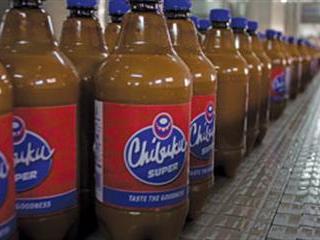
What is Chibuku?
Chibuku is an opaque beer based on traditional African recipes using maize and/or sorghum, depending on local tastes. It is a low-alcohol beer sold in 1l cartons and ferments in the package, with alcohol strength increasing from 0,5% alcohol by volume (ABV) on day one up to 4% ABV on day five before expiry.
Given its short shelf life it must be brewed and consumed locally. A new variant, ‘Chibuku Super’ was launched in Zambia in September. Chibuku Super is lightly carbonated and pasteurised, meaning it has a fixed alcohol content of 3,5% ABV and a longer shelf life.
Which African countries are you operating in?
Zambia, Mozambique, Zimbabwe, Ghana, Swaziland, Tanzania, Lesotho, Uganda, Botswana and Malawi.
SABMiller has invested US$16 million (R137 million) over the last 18 months in expanding the traditional beer market. What has this been spent on?
We have invested heavily to grow capacity and stay ahead of demand across Africa. Chibuku Super has been brewed successfully on a small commercial basis in Zambia for the past 12 months and in the past few weeks, we commissioned a larger plant at Kitwe, in the north. New ‘Super’ production lines will also be in place in Mozambique and Zimbabwe by the end of this year.
We have also launched full-scale Chibuku production in Ghana, Mozambique, Swaziland and Tanzania, following successful pilot schemes. A Lesotho pilot has been launched with commercial sales expected in the next few months and we are planning a new plant in Uganda as part of the new brewery under construction in Mbarara.

Hloni Matsela
What will this expansion mean for volumes?
We expect that Chibuku volumes across new markets in Africa will total well over half a million hectolitres by the end of this financial year. The expansion of the brand more than doubles the number of Chibuku markets from four (Botswana, Malawi, Zambia and Zimbabwe) at the start of 2011. This expansion has also created 200 direct jobs, supporting a further 1 500 jobs indirectly.
Is a mainstream beer accepted by the traditional beer market?
SABMiller’s expansion of Chibuku is part of its strategy to make more affordable beers for lower-income consumers across Africa. It takes market share from the often unsafe ‘informal’ alcohol market. It also provides a guaranteed market for smallholder farmers who produce the maize and sorghum used in production. The expansion of our Chibuku operations illustrates how we are driving our affordability strategy, product innovation and maintaining momentum behind our ‘Farming Better Futures’ programme.
Where are you sourcing raw materials from?
In the year ending March 2012, we sourced maize and sorghum from around 40 000 smallholder farmers across Africa.
What quantities are purchased from these farmers?
Our stated ambition is to purchase 50% of our agricultural raw materials from local sources in the next couple of years. In Uganda, for example, smallholder farmers from whom we purchase sorghum saw their income increase seven-fold between 2002 and 2007.
Why source locally instead of importing from established suppliers?
We source locally because it promotes wealth creation and growth in that country. On beer brands such as Eagle, Impala and Chibuku, we negotiate with the governments to sell at a lower price than the mainstream beer. To do that, our input costs must come down. We achieve this in part by sourcing locally and in part by getting a tax break on those products. The governments will give us a break if we can demonstrate that we are sourcing locally.
When was the Lesotho brewery launched and where will raw materials for it be sourced from?
The Chibuku plant in Lesotho was launched this year and commercial sales are expected in the next few months. We will source materials locally where possible.
Do you intend to launch Chibuku in SA?
We previously sold our Chibuku business in South Africa and have as a result been out of business in this category for a number of years. We reserve our options about re-entering the market.
What quantities of raw materials are sourced from SA’s commercial and small-scale farmers? How much is imported?
The combined procurement of hops, barley, maize and sugar (for our Coca-Cola bottling subsidiary ABI) is about 500 000t per annum, of which about 70 000t is imported. We often procure from farmer co-operatives which procure from both commercial and small-scale farmers and we also procure from an average of 100 small-scale barley farmers in Taung.
What type of farming practices is SAB encouraging under its ‘Farming Better Futures’ programme?
Our farming projects work with farmers to ensure that they have access to tools, skills, credit and markets to gain an income, and that we have a regular and cost-efficient supply of crops to brew beer. The introduction of better varietals – whether they are sorghum or cassava – can have a significant impact on productivity and we typically see significant increases in farmer yields as a result of these improvements.
Contact SABMiller Africa on 011 407 1700













